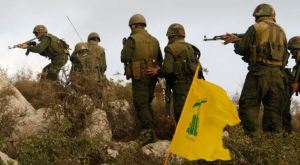nsnbc : Wednesday morning the Syrian Al-Qaeda franchise Jabhat Al-Nusra released three captured Hezbollah fighters in exchange for three individuals held by Lebanon, said Major General Abbas Ibrahim, head of Lebanon’s General Security. The completed prisoner exchange means that conditions have been met for the transfer of some 10,000 Al-Nusra and other militants, their families, and a large number of non-combatant Syrians to Syria’s Idlib province.
The transfer was part of an agreement, reached last week, between the Lebanese, Iranian-backed Hezbollah and the Syrian Al-Qaeda franchise Jabhat al-Nusra. However, the transport was delayed due to continued negotiations over the Hezbollah – Al-Nusra prisoner swap. Major General Abbas Ibrahim said there would be some 120 militants carrying weapons among the thousands, militants as well as displaced Syrian civilians, who are set to leave from the Syria – Lebanon border region to the “rebel-held” Idlib province.
Lebanese sources on the ground reported to nsnbc that the number of militants among those transferred is considerably higher than the 120 “armed” militants, and that Al-Nusra uses displaced non-combatants as de facto human shields. The agreement substantiates claims to the effect that most of the “rebels” in Syria’s Idlib province are linked to the internationally outlawed Jabhat Al-Nusra. The Al-Qaeda francise is not party to any de-escalation agreement.
Ibrahim added that another five Hezbollah militants would be released as soon as the first convoy safely arrives in Idlib. The head of Lebanon’s General Security confirmed that Lebanese authorities had received the three Hezbollah fighters and handed over three individuals held in Lebanon, as requested by Jabhat al-Nusra before 1 a.m. Beirut time or 2200 GMT.
Last week Hezbollah seized control over most of the mountainous area straddling the Syria – Lebanon border. The move also consolidated Hezbollah’s power in Lebanon’s strategically, politically and economically important Beqaa (Bekaa) valley. The valley had come under attack by Al-Nusra since 2013 when Saudi officials promised to set the Beqaa ablaze if Hezbolla intervened in Syria.
In October 2013, about 40.000 Saudi Arabia and Western – backed fighters under the banners of Jabhat al-Nusra, Liwa-al-Islam and others, turned the Lebanese side of the border in the Qalamoun region into a massive military staging theater that included advanced logistics, weapons and munitions factories, training facilities, as well as command and intelligence networks. Al-Nusra has since then suffered a number od significant setbacks along the Syria – Lebanon border, ultimately also resulting in the prisoner swap and transfer of “displaced”.
The Lebanese National Army, which receives considerable support from the United States, the United Kingdom, France and other NATO members did not actively participate in the so-called Jroud Arsal (Jaroud) operation that resulted in the defeat of Al-Nusra. However, the Lebanese National Army did establish defensive positions around the town of Arsal.
The role of the Lebanese National Army has traditionally been relatively “neutral” with respect to actual and potential internal disputes in Lebanon. The role of the National Army is, in other words, difficult and a highly sensitive matter. Hezbollah operates in Syria on invitation of the government of the Syrian Arab Republic. Hezbollah is both a major political party (Hezbollah – Party of God) and a Shia – Iranian-backed militia that operates legally in Lebanon as well.
However, Lebanese Prime Minister Saad Hariri is among many in Lebanon who have sharply criticized Hezbollah for its role in Syria. Hariri, who maintains close ties to Saudi Arabia, and who is a member of the influential US-backed think tank “The Atlantic Council” has repeatedly been linked to support to Al-Nusra and other Syrian “rebels”. Hariri has also been directly linked to the Islamic State’s 2013 invasion of Iraq.
Hariri repeatedly expressed deep concern about the role of Tehran in Lebanon, Syria, and other Arab countries. Hariri’s interests converge with those of the USA, UK, other NATO members, Israel, Jordan, Saudi Arabia, and others who would like to see Hezbollah’s and Iran’s influence in the Iraq – Syria – Lebanon – and the Israeli-occupied Syrian Golan Heights curbed.
CH/L – nsnbc 02.08.2017
Source Article from https://nsnbc.me/2017/08/02/hezbollah-al-nusra-swap-prisoners-transport-of-10000-to-syrias-idlib-province-expected-wednesday/
 RSS Feed
RSS Feed















 August 2nd, 2017
August 2nd, 2017  Awake Goy
Awake Goy 











 Posted in
Posted in  Tags:
Tags: 













